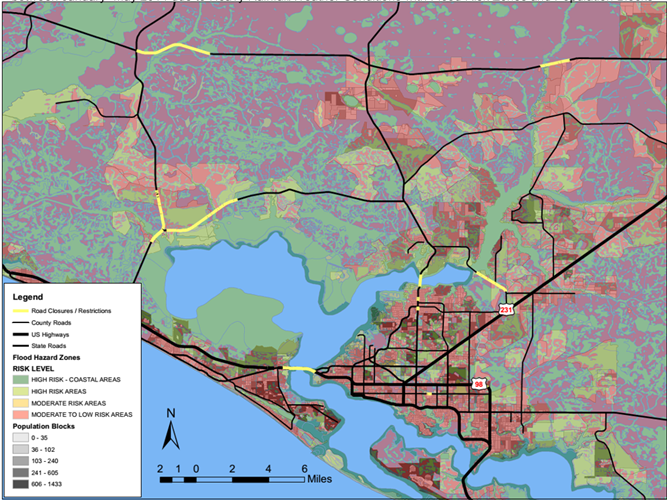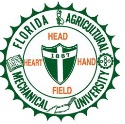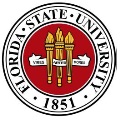

 Eren
Erman Ozguven
Eren
Erman OzguvenAssociate Professor
FAMU-FSU College of Engineering
Department of Civil and Environmental Engineering
Projects
National Science Foundation
CAS-Climate: Workshop on Resilience Research and Practice in the Gulf Region (ongoing)
This
grant is in support of a three-day workshop to bring together scholars
and stakeholders for the purpose of building a community of practice
focused on climate resilience research and practice in the Gulf Region.
SCC-CIVIC: Rural Resiliency Hubs: An Integrated, Community-Centered Approach to Addressing the Resiliency Divide through Rural Public Libraries (ongoing)
The
objective of this project is to study and evaluate the role of rural
libraries as resiliency hubs with a focus on the interactions between
community actors, population needs, environment, information, and
infrastructure to foster disaster resilience in communities.
More...
Excellence in Research: Bending the Curve for Vulnerable Populations: A Data-Analytical and Socio-Technical Decision-Making Framework for Sheltering in Hurricane-Pandemics (ongoing)
This
project takes a community-engaged, multi-disciplinary approach to
address the pressing research problems for concurrently occuring
hurricanes and pandemics, with a focus on the challenges facing
vulnerable populations.
More...
More...
CoPe RCN: Resilient Rural Infrastructure (ongoing)
The objective of this project is to explore how to achieve adaptive capacity and resilience for Gulf coastal communities, which has the potential to extend to other rural communities in the U.S., and to foster a new understanding of the complex interactions among the key elements of community resilience in rural coastline areas.
Excellence in Research: Integrated Hazard and Traffic Modeling for Massive Evacuation in Florida under Uncertainty of Hurricane Track (ongoing)
This
project integrates coastal hazard modeling with comprehensive
evacuation modeling while considering the uncertainty of hurricane
track. With the integration of these models and the capability to
examine the interdependencies of the critical infrastructure, better
dynamic evacuation models can be produced.
More...
More...
One Bridge at a Time: Bridging the Digital Divide for the Well-Being of Aging Populations in Smart and Connected Communities (ongoing)
The objective of this project is to develop a
collaborative, multidisciplinary research platform and to study the
relationship between Smart and Connected Communities (S&CC) and the
built environment (e.g., varying urban densities and demographics),
centered on creating S&CC that incorporate the aging population to
improve the wellfare of growing aging population in the U.S.
More...
More...
UHDNETCity: User-centered Heterogeneous Data Fusion for Multi-networked City Mobility (completed)
The UHDNETCity will be
able to bring measurable mobility benefits and improve the City of
Tallahassee residents' quality of life in terms of (1) lowering energy
consumption by vehicles and infrastructure, (2) reducing congestion,
crashes and traveler frustration, (3) improving safety andr
reliability, and (4) providing a more streamlined, efficient and
cost-effective system to operate and maintain city service networks.
More...
FSU News Web Link
FAMU-FSU COE Web Link
More...
More...
More...
More...
More...
More...
FDOT Research Showcase
More...
More...
More...
More...
More...
More...
More...
More...
FSU News Web Link
FAMU-FSU COE Web Link
UF-FSU Clinical and Translational Award (CTSA)
All-inclusive Hurricane Resilience to Bridge the Resilience Divide for Special Needs Populations Living in Rural Communities (ongoing)
The overall goal of this project is to better understand the factors that foster and support the efficacy of all-inclusive and equitable hurricane resilience for varying vulnerable population segments.Institute of Museums and Library Sciences
iSmart for Disasters: Exploring Smart and Connected Disaster Planning for Small and Rural Libraries (ongoing)
The overall goal of this project is to explore existing disaster preparedness, response and recovery plans in the state and how libraries can be utilized to solve the existing challenges in improving the community resilience against disasters.More...
Florida Department of Economic Opportunity
Intra-Regional Mitigation Planning Coordination and Integration of Social Vulnerability and Housing Assessments (ongoing)
The purpose of this project is to develop a more efficient, streamlined, and coordinated hazard planning process at the state, regional, county, and municipal level with specific focus on understanding and prioritizing the needs of socially vulnerable populations and assessing and ensuring the stability of post-disaster housing opportunities.Florida Department of Transportation
Using Computer Vision and Deep Learning Techniques to Extract Roadway Geometry from Aerial Images (ongoing)
The overall goal of this project is to develop computer vision tools to extract different geometry data such as school zone markings, and lane configurations.More...
Diagnostic Tests and Significance Thresholds for Crash Prediction Models: A Phase 1 Study (ongoing)
The overall goal of this project is to conduct an extensive quantitative assessment of the Poisson and Negative Binomial based safety performance functions currently used for Florida roadways under various temporal and geographical data-set scales.Development of Congestion Factors for Adjusting Traffic Counts during Congested Periods: Phase 1 - Literature Review and Survey (ongoing)
The overall goal of this project is to develop congestion factors suitable for use by the Florida Department of Transportation to adjust traffic counts during congested periods in urbanized roadway sections.Improving Safety at Highway-Rail Grade Crossings in Florida while Maintaining Continuity of Passenger and Freight Flows: A Multi-Objective Approach (ongoing)
The overall goal of this project is to develop a multi-objective optimization model that can assist the FDOT personnel with identification of highway-rail grade crossings that have to be upgraded and selection of the appropriate upgrading type, considering the budget constraints.More...
Feasibility Analysis of Real-time Intersection Data Collection and Processing using Drones (completed)
The overall goal of this project is to test the feasibility and efficiency of drone-based real-time data collection and processing at intersections.More...
Development of the Optimization Model for Improving Safety at Rail Crossings in Florida (completed)
This project developed a standalone application, "HRX Safety Improvement", in order to assist the FDOT personnel with resource allocation among the highway-rail grade crossings in the State of Florida.More...
Development of Safety Performance Functions for Restricted Crossing U-turn (RCUT) Intersections (completed)
This project provided appropriate safety performance functions for different types of RCUT intersections for use by DOT planners and engineers at various levels of project development and safety analysis.More...
FDOT Research Showcase
Establishment of Effective Control Factors to Achieve Federal Enforcement Consistency with the Highway Beautification Act (completed)
This project identified the most critical inconsistencies and regulatory difficulties associated with the Federal AOC program across the nation through a comprehensive survey among the State Departments of Transportation (DOTs).More...
Natural Hazards Center
Sheltering Behavior and Shelter Access in the Southeastern United States (ongoing)
This interdisciplinary project examines shelter access and sheltering behavior during the December 10-11, 2021 Tornado event, with a focus on Western Kentucky.More...
Significance of Secondary Infrastructure for Shelter Management in the Aftermath of Hurricane Michael (completed)
This study describes secondary and primary infrastructure available for long-term shelter operations in Bay County, Florida in the aftermath of Hurricane Michael.More...
Center for Accessibility and Safety for an Aging Population (ASAP)
Needs Assessment for Multi-modal Emergency Transportation Operations with a Focus on an Aging Population (completed)
This project describes the conceptual foundation and components necessary to create an aging population-focused knowledge base with importance given to both ensuring the resiliency of the transportation infrastructure and meeting the needs of aging population.More...
Travel Time and Roadway Capacity Reliability for an Aging Population: The Development of a Model Integrating Roadway Traffic with Aging Adults' Driving Behavior (completed)
This project derives mathematical models that jointly considers aging adults' travel behavior and traffic on roadway networks in the context of transportation accessibility, safety and reliability.More...
Senior Community Resilience: Assessing the Interdependencies between Critical Transportation Infrastructures and Implications on Aging People's Households (completed)
This project presents a multii-disciplinary approach that should (a) evaluate the stochastic interactions between critical assets and roadways in terms of their exposure to different types of problems such as system disruptions due to disasters, and (b) develop mathematical solutions to minimize the effect of these disruptions on the aging communities and households.More...
Metroplan Orlando
Transit-Oriented Development and SunRail Riders: What's the Connection? (completed)
This project attempts to address the connections between the new transit-oriented development (TOD) at SunRail stations and riders, and it identifies several takeaways, insights, and next steps for Central Florida's decision makers.More...
News
More...
More...
More...
More...
More...
More...
NSF Website...
Project Website...
Resilient Infrastructure and Disaster Response (RIDER) Center is established
New RIDER Center will serve as a technology hub for resilience and disaster research. The center aims to establish and develop emergency plans that fit the needs of both urban and rural communities.More...
New National Science Foundation Project: SCC-CIVIC: Rural Resiliency Hubs
The goal of this project is to study and evaluate the role of rural libraries as resiliency hubs with a focus on the interactions between community actors, population needs, environment, information, and infrastructure to foster disaster resilience in communities.More...
New National Science Foundation Project: Excellence in Research: Bending the Curve for Vulnerable Populations
This project takes a community-engaged, multi-disciplinary approach to address the pressing research problems for concurrently occuring hurricanes and pandemics, with a focus on the challenges facing vulnerable populations.More...
National Science Foundation Project: Cope-RCN: Resilient Rural Infrastructure
The objective of this project is to explore how to achieve adaptive capacity and resilience for Gulf coastal communities, which has the potential to extend to other rural communities in the U.S., and to foster a new understanding of the complex interactions among the key elements of community resilience in rural coastline areas.More...
Article in the Conversation: How Rural Areas Like Florida's Panhandle Can Become More Hurricane-ready?
It is extremely challenging to prepare for very fast Category 5 hurricanes like Hurricane Michael. But proactive planning and community-level decision making can ensure that no one is left without assistance.More...
National Science Foundation Project: Excellence in Research: Integrated Hazard and Traffic Modeling for Massive Evacuation in Florida under Uncertainty of Hurricane Track
This project integrates coastal hazard modeling with comprehensive evacuation modeling while considering the uncertainty of hurricane track. With the integration of these models and the capability to examine the interdependencies of the critical infrastructure, better dynamic evacuation models can be produced.More...
National Science Foundation Project: SCC-RCN: One Bridge at a Time: Bridging the Digital Divide for the Well-Being of Aging Populations in Smart and Connected Communities
The objective of this project is to develop a collaborative, multidisciplinary research platform and to study the relationship between Smart and Connected Communities (S&CC) and the built environment (e.g., varying urban densities and demographics), centered on creating S&CC that incorporate the aging population to improve the wellfare of growing aging population in the U.S.NSF Website...
Project Website...